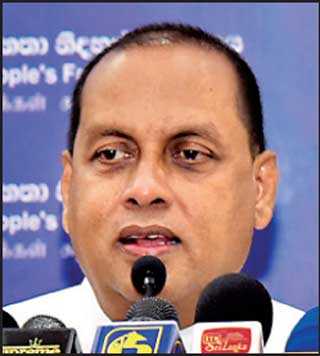Thursday Feb 19, 2026
Thursday Feb 19, 2026
Friday, 14 February 2020 00:06 - - {{hitsCtrl.values.hits}}
By Nuwan Senarathna
Power and Energy Minister Mahinda Amaraweera yesterday acknowledged that the Government had limited time to take a decision on potentially moving forward with a proposed LNG power plant as
 |
UPFA General Secretary Mahinda Amaraweera - Pic by Ruwan Walpola |
parliament is likely to be dissolved early March but assured that uninterrupted power supply would be maintained.
He said a six-member committee has been appointed by the Ministry this week to review power generation on a daily basis.
Speaking to reporters at the Sri Lanka Freedom Party (SLFP) head office, Power and Energy Minister Mahinda Amaraweera said yet another discussion on how to proceed with the construction of the LNG plant is likely to take place at the Cabinet meeting next Wednesday. There are only two Cabinet meetings that will probably be held before parliament is dissolved in early March.
“We may possibly take a final decision on commencing the long delayed LNG power plant at the next Cabinet meeting. The Government is going to take immediate measures to address the power shortage, which the previous administration failed to do,” he said. However, Amamraweera did not give details on what measures the Government may take.
In the last week of January Cabinet approved several power plants to be fast-tracked for implementation including two 300 MW coal power plants, while also dusting off two 300 MW LNG power plants and considering as much as $ 100 million worth of renewables.
Sri Lanka has not set up any power plants in the past five years. In 2014 the second and third stages of the Norochcholai power plant were completed, adding 570 MW to the national grid. In the subsequent year, a 60 MW plant was added but since then power plants that were listed in the Long Term Generation Plan of the Public Utilities Commission of Sri Lanka (PUCSL) were limited to paper. Repeated Cabinet approvals during the last four years failed to see any implementation on the ground with many running into controversies and cancellations.
“The Ministry of Power and Energy has taken all measures to ensure uninterrupted power supply. A unit of electricity purchased at a cost of Rs.24 but charge Rs.16 from the public. The government also supplies electricity a unit at Rs. 2.60 to 1.7 million low income families,” he added.
